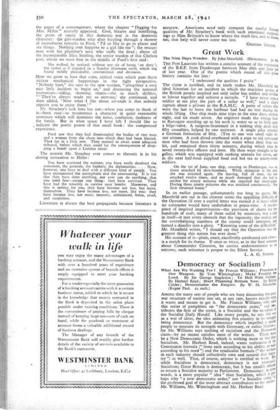Great Work
The Nine Days Wonder. By John Masefield. (Heinemann. 33, 6d.
THE Poet Laureate has written a concise account of the evacuation of the E.E.F. from Dunkerque between May 26th and June 3rd of last year. One of the poems which round off this prose history contains the line :
" I understand the qualitits I praise."
The claim is justified, and its truth makes Mr. Masefield the ideal historian for an incident in which the maritime genius of the British people inspired not only sailor but soldier and civilian to labour together and achieve a miracle. " I have never seen a soldier at sea play the part of a sailor so well," said a ship's captain about a private in the R.A.M.C. A party of sailors who were the last to leave the harbour had had no rest during the whole lifting. One ship made nine trips in the nine days, another eight, and six made seven. An engineer made the voyage back to Ramsgate standing up to his neck in water so as to hold open a bilge-valve. A surgeon-lieutenant in a sinking ship dealt with fifty casualties, helped by one assistant. A single pilot attacked a German formation of fifty. (Ten to one was small odds for our airmen. A cook dived overboard with a rope to aid exhausted men who had been thrown into the water when their boat was hit, and remained there thirty minutes, during which time he saved twenty-five officers and men. He then went straight to his galley, which was equipped with cooking utensils for seven, and in the next half-hour supplied food and hot tea to ninety-seven soldiers.
On the 1st of June, one ship, crossing to Dunkerque, was six times attacked by dive-bombers. While alongside at the jetty she was attacked again. On leaving, full of men, she was attacked twelve times, and so much damaged that she had to anchor for ninety minutes while she repaired her steam-pipes. During those ninety minutes she was attacked continuously. She then returned home."
In an earlier passage, unfortunately too long to quote, Mr. Masefield sets out in the clearest terms the appalling difficulty of the Operation (if ever a capital letter was earned it is here) which no contractor would have undertaken in peace-time. A master- piece of inspired improvisation—the provision of charts for the hundreds of craft, many of them sailed by amateurs, was a task in itself—it met every obstacle that the ingenuity, the malice, and the overwhelming numbers of the enemy could interpose, and turned a disaster into a glory. " Knowing some of the difficulties,' Mr. Masefield writes, " I should say that the Operation was the greatest thing this nation has ever done." His account of it—plain, exact, excellently condensed and clear- is a match for its theme. If once or twice, as in the final sentence about Commander Clouston, he carries understatement to an extreme, such reticence is proper to the Silent Service.
L. A. G. STRONG.






























 Previous page
Previous page